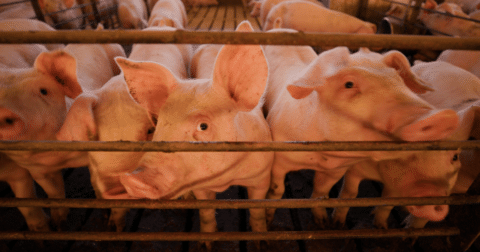Analysis
The Loss of Chevron Could Also Be a Major Loss for Animals
Law & Policy•6 min read
Reported
A new documentary chronicles the damage hog farm pollution has caused communities of Eastern North Carolina.


Words by Jessica Scott-Reid
The fight between residents of Eastern North Carolina and the hog industry has been going on for more than three decades. The residents who live in and around Duplin County, Sampson County and Bladen County — who are mainly Black and people of color — have protested the hog industry practice of storing manure and other hog waste in open-air lagoons, and then spraying that waste onto nearby land — their land. Now, a new feature-length documentary called “The Smell of Money” has documented the fight, and the noxious odors, air and water pollution and health problems that have long plagued community residents, whose families have been on that land since the time of slavery. And a growing number of people — from community organizers to celebrities Joaquin Phoenix and Rooney Mara — are screening the movie for audiences in hopes of sparking change.
North Carolina is the second largest hog farming state in the U.S., where there are nearly as many pigs as people (8 million and 10 million, respectively). Yet there’s never been a film that puts this story front and center.
Completing “The Smell of Money” took filmmaker Jamie Berger and director Shawn Bannon over six years to complete. Berger, who is from North Carolina, had been researching the impacts of the hog industry since her days as a high school student. “I started learning about [the] environmental issues,” she says, which prompted her to stop eating meat. Berger continued to study the food system as an undergraduate, she says, “in particular, animal agriculture: how it affects the environment, animals, people.” But it was her honors thesis on North Carolina’s pork industry that made the work personal. “What was so gut wrenching and heart wrenching was learning about this element of environmental racism — that community members, not that far from where I grew up, were having animal waste sprayed on their homes, essentially imprisoning them in their houses.”
The environmental justice movement grew out of the civil rights movement and environmental movements of the 1960s and 1970s, according to the Congressional Black Caucus Foundation. The U.S. Department of Energy reports that “the initial environmental justice spark sprang from a Warren County, North Carolina, protest,” where, “In 1982, a small, predominately African-American community was designated to host a hazardous waste landfill,” which “would accept PCB-contaminated soil” from toxic waste that was dumped illegally. The movement gained steam throughout the 1980s, the same decade of industrial-scale hog farming began rapidly expanding in the state of North Carolina.
“The Smell of Money” — which is available to watch on various platforms and has a 100 percent rating on Rotten Tomatoes — documents the impacts of environmental racism through the stories of the people who have lived in North Carolina. In the eastern part of the state, residents and activists have long fought hog industry players like Smithfield Foods, the largest pork producer in the world, and its subsidiary Murphy-Brown. Since the late 1990s, residents who live near industrial pork farms and slaughterhouses have protested, sued and organized in an effort to stop the contamination of their land, water, homes and even their bodies, with animal waste.
There have been some victories. In 2018 and 2019, juries awarded around 500 residents impacted by neighboring hog farms almost $550 million in total as a result of numerous lawsuits.
These totals were ultimately capped however, at about $98 million, due to a North Carolina law limiting punitive damages. As a result, after legal fees were paid and damages divided among the residents, says Berger, “peoples’ lives were not transformed.” And today, “the situation is really the same as what you see in the film,” she says — the North Carolina hog industry continues to thrive while the residents, the environment and the animals continue to suffer.
For Berger then, the film has become a way for the fight to continue. Advocates, organizations, student groups, faith groups and even celebrities have hosted over a hundred screenings of The Smell of Money across the country and beyond, not only to raise awareness but to influence political action. “We’ve had screenings across the state of North Carolina,” she says, “to try to get people to weigh in on a public comment period about factory farming, and trying to change the permit system that regulates how the waste is managed.”
Sherry Williams, an environmental racism expert and community organizer in Atlanta, has helped organize screenings, at historic Black churches in the city and beyond. For Williams, the documentary touched on “several equity issues that I am passionate about,” including environmental racism, access to healthcare, voter rights, animal rights, and landowner and property rights. “People need to be educated on what is going on,” she says, “how this is happening in plain sight — at an alarming rate — and how voting can turn this around, through our courts and the ballot box.”
Screenings in Atlanta (also hosted by Christopher “Soul” Eubanks) featured vegan food from local restaurants, says Berger, as well as talks about health and wellness, and Q&As with the filmmaker.
For three years now, food system advocate Claudia Lifton has been organizing for plant-forward food purchasing policies in the city of Denver, “one of the most rancher- and Big-Ag-influenced cities in the country.” Lifton is a chair of the Sustainable Food Policy Circle, a group whose membership she describes as having been “challenging to convince,” whenever she tried talking to them about the climate impact of meat and dairy, thanks “in large part due to the deep ties between the city and the ranching community.” But screening the film has created the shift she was looking for. “I’ve never seen a film…have this kind of impact before.” Now, Lifton feels part of a coalition: “a working group of folks…passionately working alongside me.”
The film fosters empathy, or at least that was Berger’s intent. “When you look another human being in the eyes, and you see what they are experiencing, and witness that almost firsthand, it’s so much harder to turn away.”
Correction: an earlier version of this story misspelled Jamie Berger’s last name.